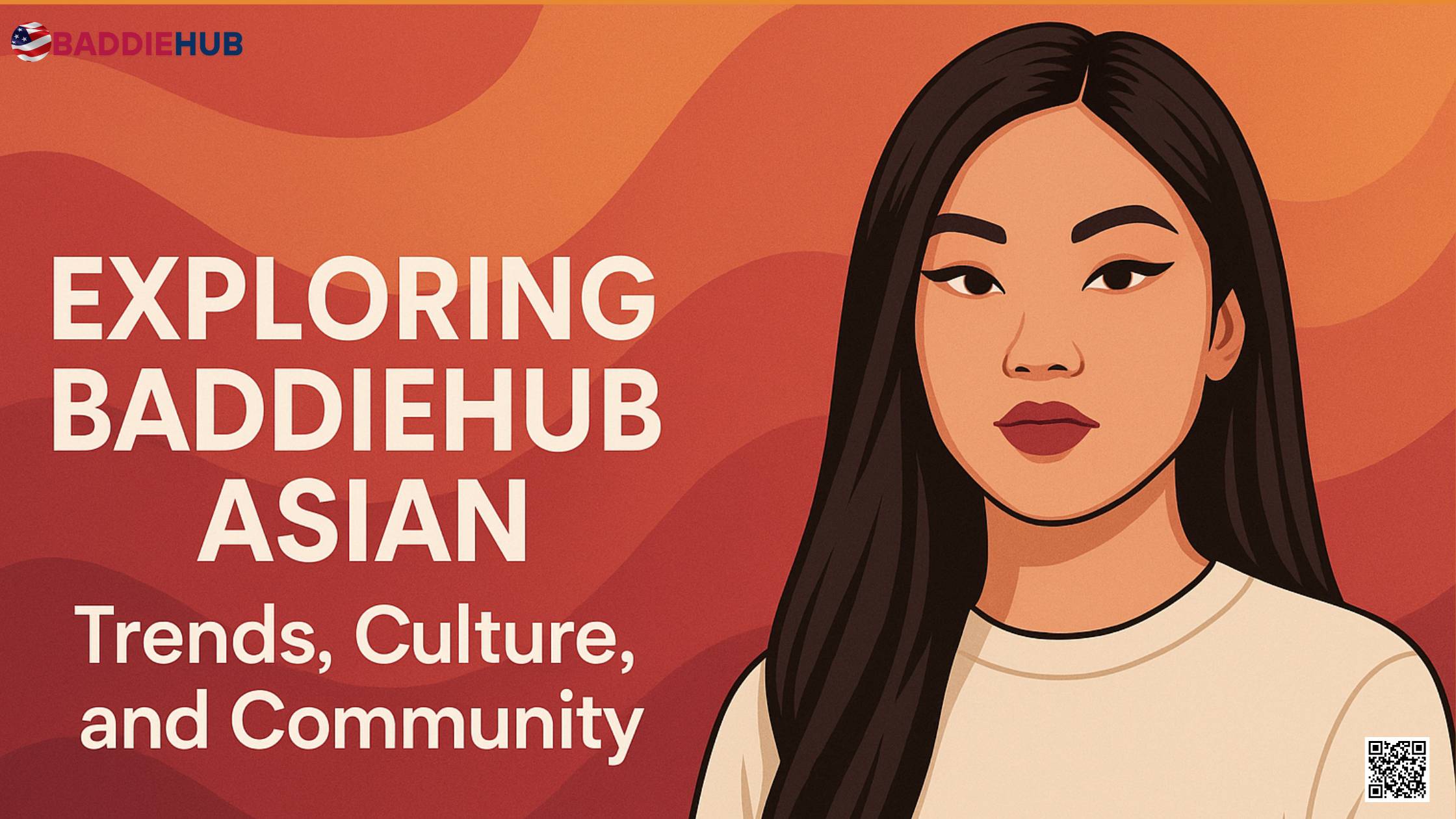Introduction to Baddiehub Asian

What does “Baddiehub Asian” mean?
Baddiehub Asian refers to a vibrant digital subculture where Asian creators showcase bold fashion, beauty, and lifestyle aesthetics rooted in both Western and Eastern influences. The community grew on platforms like TikTok and Instagram, blending modern Asian culture with global “baddie” trends.
Why is Baddiehub Asian gaining popularity?
The appeal lies in its fusion of streetwear, K-beauty, meme culture, and fandoms, offering a new space for Asian identity, creativity, and self-expression online.
What will this article cover?
This guide will explore Baddiehub Asian’s origins, aesthetic styles, key influencers, cultural impact, criticisms, and future directions.
Origins and Evolution of Baddiehub Asian
How did Baddiehub Asian start?
Baddiehub Asian evolved from early 2010s Western “baddie” aesthetics—think Instagram models and streetwear icons—blended with Asian youth culture, K-pop influences, and the e-girl style seen on TikTok.
Key Historical Influences:
- Influencers: Asian-American and Asian-Canadian creators amplified the trend.
- Platforms: Instagram and TikTok acted as launchpads.
- Fashion: Streetwear brands like Off-White, Supreme, and local Asian designers fueled the look.
- Beauty: K-beauty routines with a bold twist became essential.
Example: TikTok viral videos in 2020 featuring “Asian baddie transformations” attracted millions of views, marking a turning point.
| Period | Influence | Example |
| 2015-2017 | Instagram Baddie Rise | Kylie Jenner-style glam |
| 2018-2020 | TikTok E-girl Merge | Asian baddie makeup |
| 2021-Now | Full Community Formation | Baddiehub Asia fandoms |
Key Aesthetic Trends in Baddiehub Asian Culture
What defines the Baddiehub Asian look?
The Baddiehub Asian aesthetic is marked by bold fashion, curated beauty standards, edgy poses, and meticulously edited social media content.
Core Aesthetic Elements:
- Fashion: Baggy jeans, crop tops, chunky sneakers, Y2K nostalgia.
- Beauty: K-beauty meets glam—flawless skin, winged eyeliner, bold lips.
- Attitude: Confident, rebellious, unapologetic self-presentation.
- Editing Style: Heavy filters, color-coordinated grids, soft glam edits.
Example: An Instagram feed featuring pastel color palettes with soft glam selfies exemplifies the Baddiehub Asian aesthetic.
| Trend | Characteristics | Example |
| Fashion | Streetwear x Glam | Oversized hoodies, Dior bags |
| Beauty | Flawless yet bold | Dewy skin, fox eye makeup |
| Editing | Vibrant & Cohesive | VSCO-inspired presets |
Top Influencers Driving the Baddiehub Asian Scene
Who are the faces of Baddiehub Asian?
Influential Asian creators across TikTok, Instagram, and YouTube popularize the movement with signature looks, viral posts, and brand collaborations.
Prominent Figures:
- @ava.gg: TikTok sensation known for viral Asian baddie tutorials (2.5M followers).
- Jenn Im: YouTube style guru blending K-fashion with street glam (3M subscribers).
- @liyapet: Instagram influencer showcasing edgy streetwear looks (500K followers).
- Edward Avila: K-beauty expert promoting genderless baddie aesthetics.
Example: Ava’s TikTok on “Baddie makeup for monolids” hit 10M views, inspiring thousands.
| Name | Platform | Specialty |
| Ava | TikTok | Makeup transformations |
| Jenn Im | YouTube | Fashion vlogs |
| Liya Pet | Streetwear styling | |
| Edward Avila | YouTube | K-beauty tutorials |
Cultural Impact and Reception
How has Baddiehub Asian influenced culture?
Baddiehub Asian reshapes perceptions of Asian identity online, creating a platform for self-representation beyond traditional stereotypes.
Key Cultural Effects:
- Diaspora Influence: Asian-Americans and Asian-Europeans adapt the trend for hybrid cultural expression.
- Cultural Exchange: Merges Western street style with K-pop and J-fashion sensibilities.
- Global Spread: Asian baddie aesthetics trend in the U.S., Europe, and Southeast Asia.
Example: Korean-American TikTokers leading viral “Asian Baddie” trends show cross-cultural appeal.
| Aspect | Impact | Example |
| Identity | Reclaims Asian beauty | Diverse body types, monolids celebrated |
| Fashion | Global influence | Zara launching K-style streetwear line |
| Online Community | Empowerment spaces | Baddiehub forums, Discord groups |
Common Criticisms and Controversies
What criticisms face Baddiehub Asian culture?
Despite its popularity, Baddiehub Asian culture faces backlash around issues of oversexualization, cultural authenticity, and the perpetuation of stereotypes.
Main Criticisms:
- Oversexualization: Some argue that the style panders to the male gaze.
- Misrepresentation: Narrow beauty ideals can exclude darker-skinned Asians.
- Stereotypes: “Exotic” framing by non-Asian audiences raises concerns.
Influencers often defend Baddiehub culture by emphasizing self-expression and body positivity against internet backlash and cancel culture threats.
Example: Discussions on Reddit’s r/AsianBeauty about “authentic representation” show ongoing debates.
| Issue | Criticism | Defense |
| Sexualization | Fetishizing Asian women | Promoting empowerment narratives |
| Colorism | Favoring lighter skin | Increasing diversity awareness |
| Stereotyping | Exoticization | Reclaiming narratives |
Future of Baddiehub Asian Culture
Where is Baddiehub Asian headed next?
The future points toward digital evolution, increased mainstream crossover, and more diverse representation.
Upcoming Trends:
- Virtual Influencers: AI-generated Asian baddie avatars on Instagram.
- Metaverse Fashion: NFT streetwear collections.
- Broader Inclusivity: Greater focus on Southeast Asian, South Asian representation.
Example: Digital creator Lil Miquela’s success hints at Asian virtual baddies becoming the next frontier.
| Future Trend | Development | Example |
| Metaverse Baddies | Virtual fashion lines | Decentraland fashion shows |
| NFTs | Avatar skin sales | Gucci NFTs |
| Inclusivity Drive | Wider Asian representation | #BrownBaddie movement |
Key Takeaways
- BaddieHub Asian merges Western “baddie” aesthetics with modern Asian culture through platforms like TikTok and Instagram.
- Origins stem from Asian-American influencers blending K-beauty, streetwear, and viral editing styles.
- Visual trends include bold streetwear, soft glam makeup, and vibrant social media edits.
- Top influencers like Ava, Jenn Im, and Edward Avila shape and grow the trend globally.
- Cultural impact fosters new Asian identity narratives, though criticisms around oversexualization and representation persist.
- Future directions lean towards virtual influencers, NFT streetwear, and broader Asian diversity.
Next we will explore Baddiehub British
